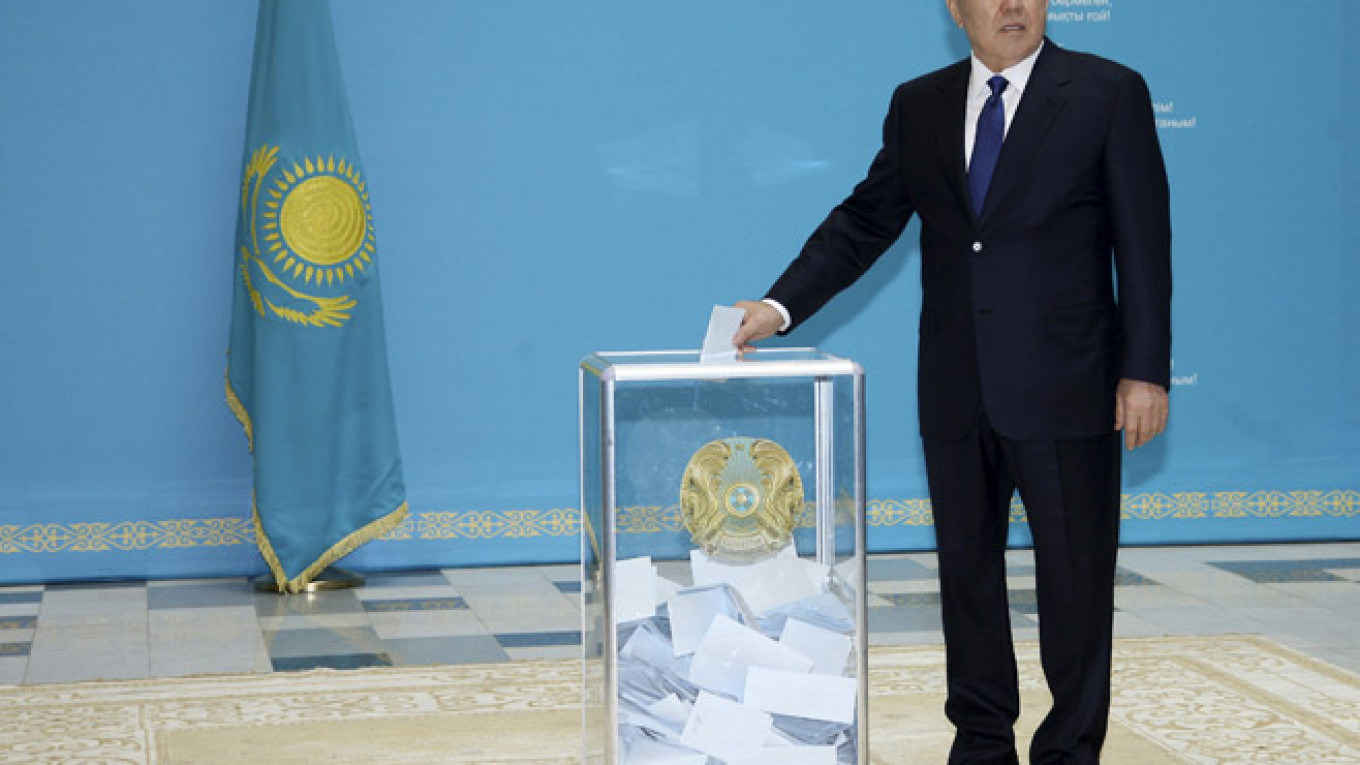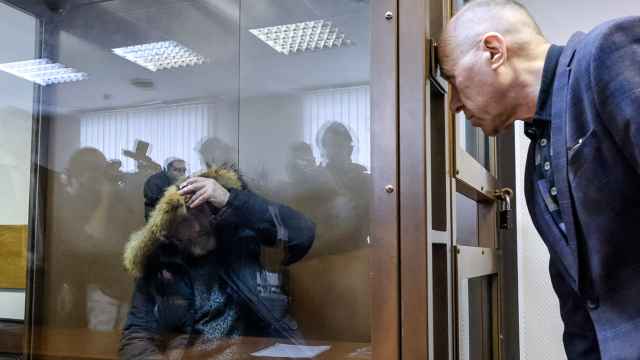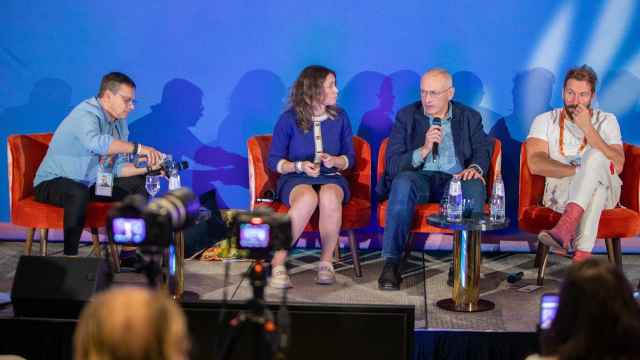The guaranteed re-election of long-standing Kazakh President Nursultan Nazarbayev on Sunday has left political analysts guessing as to who will eventually succeed the aging strongman, who has led the country for more than 25 years and has been reluctant to voice his vision of the country's future without him.
Nazarbayev, Kazakhstan's first and only president since the country gained independence from the Soviet Union in 1991, did not face any significant challengers and the first exit polls Sunday evening showed him decimating his two nominal rivals — a trade union official and a Communist politician — with 97.5 percent of the vote.
"I am confident … Kazakhstanis will vote for stability in our state, to support the policy that the country has so far been following under my leadership," a smiling Nazarbayev told reporters after casting his ballot at polling station No. 81 in central Astana, Reuters reported.
The 74-year-old Kazakh president, the second longest-serving leader of any former Soviet republic, has shown no sign of surrendering power anytime soon. Sunday's election took place one year before it had been planned, a move interpreted as a way to provide the president with a new mandate in tough economic times caused by plummeting oil prices and the slowdown of the Russian and Chinese economies, both key to Kazakhstan's prosperity.
There was no intrigue in Sunday's vote. After the certain re-election of Nazarbayev, whose tenure has been marked by clampdowns on the opposition and the implementation of authoritarian policies, the only question that remains involves the country's long-term political future.
"If there indeed is a succession plan, no one knows about it except Nazarbayev himself," said Alexei Malashenko, a scholar-in-residence at the Carnegie Moscow Center think tank.
'Leader of the Nation'
Recent constitutional amendments have demonstrated an overall reluctance to address Nazarbayev's inevitable passing. In 2007, the Kazakh Constitution was amended to establish a presidential term of five years, reducing it from the previous seven-year term, and exempt Nazarbayev from the constitutionally established limit of two presidential terms. Three years later, the Kazakh parliament granted Nazarbayev the "leader of the nation" status, endowing him with lifelong political powers.
In 2011, Kazakhstan's Constitutional Court rejected a proposed amendment that would keep Nazarbayev in the presidency until 2020, a measure the president himself publicly dismissed. But in the presidential election held in the immediate aftermath of the court's ruling, Nazarbayev garnered more than 95 percent of the vote, fortifying the notion that only he could lead the country.
Dosym Satpayev, head of the Almaty-based Kazakhstan Risks Assessment Group think tank, told The Moscow Times that Nazarbayev had provided "absolutely no signal" as to his possible successor, despite the extensive debates on the issue.
Nazarbayev failed to hint at a potential successor when he was declared "leader of the nation" in 2010, a situation during which he could have put to rest — or at least quieted — the speculation about his succession, according to Satpayev.
"This is when the debate on succession should have started on the official level," he said. "With the 'leader of the nation' title, Nazarbayev had officially been put above the pack, the constitution protecting his leadership. This is when he should have embarked on the necessary reforms to prepare for a transition period. But he didn't."
The only hint Nazarbayev seems to have made is а call last month for eventual constitutional reform as part of the Kazakhstan 2050 Strategy, an economic and political reform plan to put the country among the world's 30 top economies. Satpayev thinks the reform plan could eventually transform Kazakhstan's presidential system to a semi-presidential one, in which the president would share responsibility to the legislature with the prime minister and Cabinet.
Kazakhstan has not experienced a leadership transition in its post-Soviet history. A series of scenarios about the transition into post-Nazarbayev Kazakhstan, ranging from the democratic to the chaotic, have emerged in global political circles.
Selecting an Heir
Observers have hinted that Nazarbayev could handpick his successor, just as former Russian president Boris Yeltsin selected Vladimir Putin to replace him in 1999. The theory that he could nominate a relative — like in Azerbaijan when the ailing former president Heydar Aliyev appointed his son, Ilham Aliyev, to head his party — does not look likely. Former government official Rakhat Aliyev, the president's eldest daughter's ex-husband who at one time could have seemed like a possible candidate, had a falling-out with his former father-in-law and committed suicide in an Austrian prison earlier this year.
Analysts have downplayed the possibility of the color revolution model, which led to power transitions in Ukraine, Georgia and Kyrgyzstan, because of Nazarbayev's authoritarian regime that has vastly inhibited the emergence of independent and oppositional political forces.
Some scholars have suggested that a successor could eventually emerge from Kazakhstan's economic elite, which has profited from the exploitation of the country's 30 billion barrels of crude oil reserves and 85 trillion cubic feet of natural gas.
"There is more plurality in Kazakhstan than in any other Central Asian state," Satpayev said. "There are strong elites, which compete among themselves for resources. But competing for the presidency is out of the question."
Unlike the many Kazakhstan watchers who are reluctant to speculate about possible successors, Malashenko said he thinks current Kazakh Prime Minister Karim Massimov, among the five or six names that he said had come to his mind, could be a viable option to lead the country.
Massimov — Kazakhstan's prime minister between 2007 and 2012, who returned to the position last April — is central to the execution of the country's reform plan, according to Malashenko, who called him an "experienced politician and bright intellectual." The polyglot prime minister, who is reportedly fluent in Kazakh, Russian, Uyghur, Mandarin, Arabic and English, could balance the political forces in Kazakhstan's environment and keep the country on its path of economic success and modernization, Malashenko said.
"But overstating Massimov's prospects at the presidency could end up ruining his chances," Malashenko said, adding that the secrecy and uncertainty surrounding Nazarbayev's succession plans leave the political field wide open.
Contact the author at [email protected]
A Message from The Moscow Times:
Dear readers,
We are facing unprecedented challenges. Russia's Prosecutor General's Office has designated The Moscow Times as an "undesirable" organization, criminalizing our work and putting our staff at risk of prosecution. This follows our earlier unjust labeling as a "foreign agent."
These actions are direct attempts to silence independent journalism in Russia. The authorities claim our work "discredits the decisions of the Russian leadership." We see things differently: we strive to provide accurate, unbiased reporting on Russia.
We, the journalists of The Moscow Times, refuse to be silenced. But to continue our work, we need your help.
Your support, no matter how small, makes a world of difference. If you can, please support us monthly starting from just $2. It's quick to set up, and every contribution makes a significant impact.
By supporting The Moscow Times, you're defending open, independent journalism in the face of repression. Thank you for standing with us.
Remind me later.






